Overview
The OneSignal Drag and Drop Email Builder lets you visually design responsive emails exactly as they will appear in your users’ inboxes—without writing full HTML. You build emails using three core components:- Settings – global styles and layout applied across the entire email
- Rows – horizontal layout containers that control structure and responsiveness
- Content – individual blocks such as text, images, buttons, and HTML
Use the Drag and Drop Email Builder if you want to:
- Design emails visually without managing full HTML (HTML blocks are available)
- Reuse rows or templates across campaigns
- Allow non-technical teammates to safely edit content
Recommended build flow (default)
Follow this order for the best results and fewer rendering issues:- Configure global styles in Settings
- Add layout structure using Rows
- Insert Content blocks
- Add personalization and links
- Add an unsubscribe link (for marketing emails)
- Save as a template or send
When finished, your email should:
- Be no wider than 600px
- Render cleanly on mobile and desktop
- Include required compliance links
Import your own templates
If you already have HTML email templates, you can add them to OneSignal using:- Email Template forwarding
- Create Template API
- Copy-paste HTML into the HTML Editor
Settings
Settings define the foundational layout and styles for your email. These values cascade down to rows and content blocks unless explicitly overridden.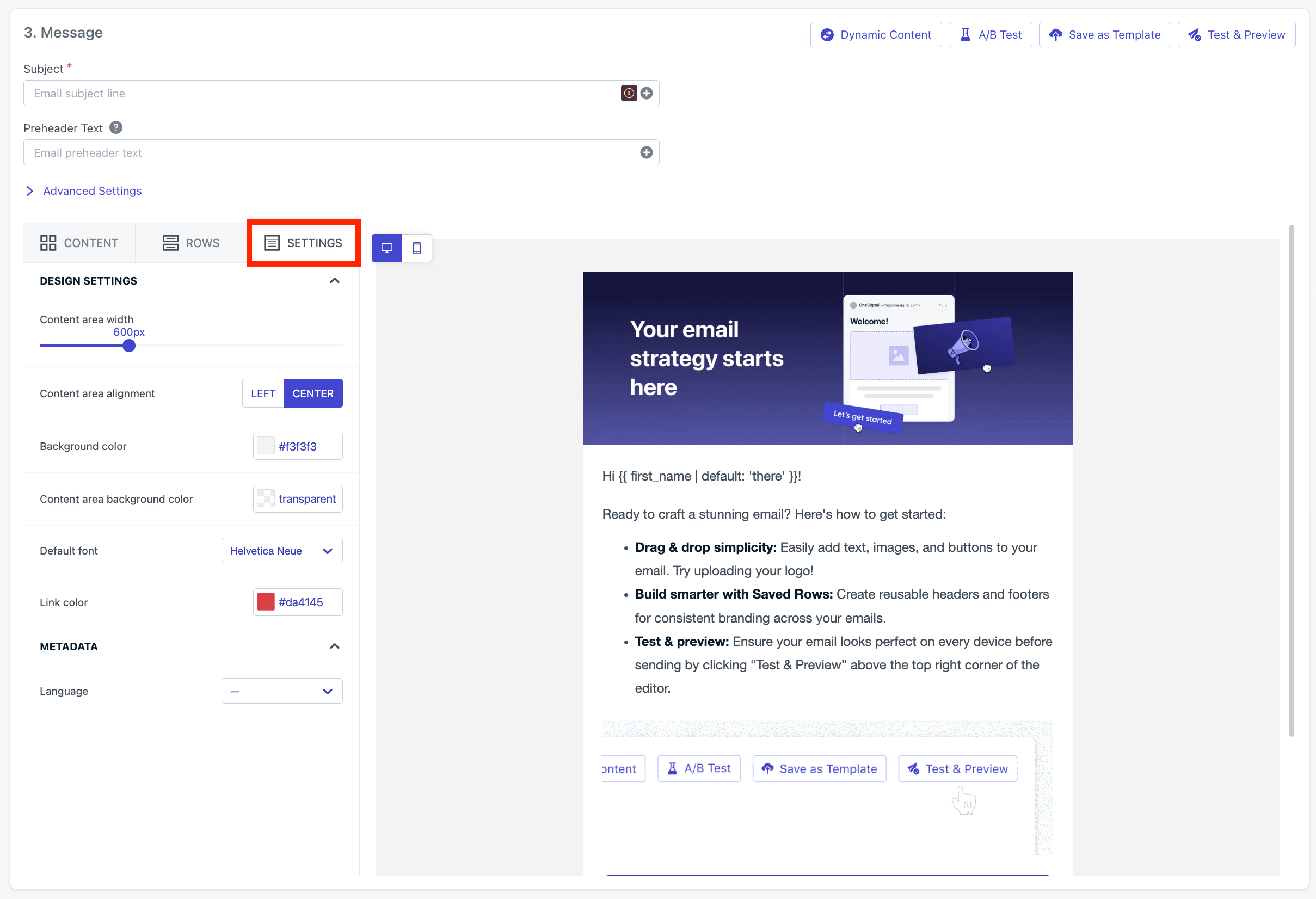
| Design Setting | Description |
|---|---|
| Content area width | Width of the email in pixels. Recommended: 600px. |
| Content area alignment | Align content left or center. |
| Background color | Color behind the content area. |
| Content area background color | Color inside the content area. |
| Default font | Applied to all text unless overridden. Custom fonts require HTML. |
| Link color | Default color for all links. |
| Language | Sets the HTML lang attribute for accessibility. Defaults to English. |
Recommended default: Configure as much styling as possible in Settings to ensure consistency and reduce per-block overrides.
Rows
Rows define the horizontal layout of your email. Each row can contain one or more columns, and each column can contain content blocks. Drag and drop rows into the editor to build your structure.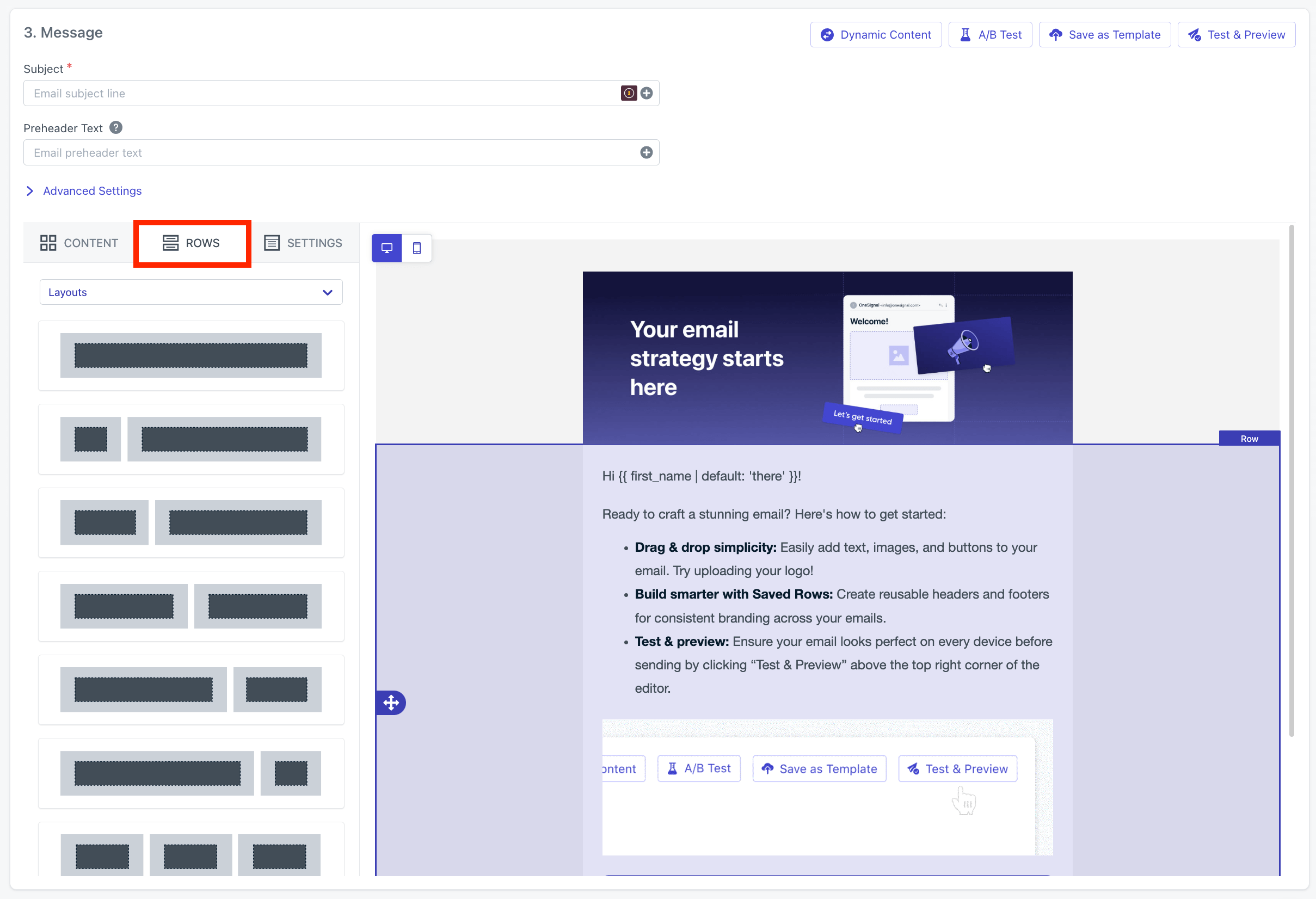
Use rows to control layout and spacing. Avoid relying on individual content blocks for major layout decisions.
Delete & duplicate rows
Select the row and use the delete and duplicate icons.
Saved rows
Saved rows let you reuse headers, footers, or repeated sections across emails and templates. Click the save icon on a row to save it.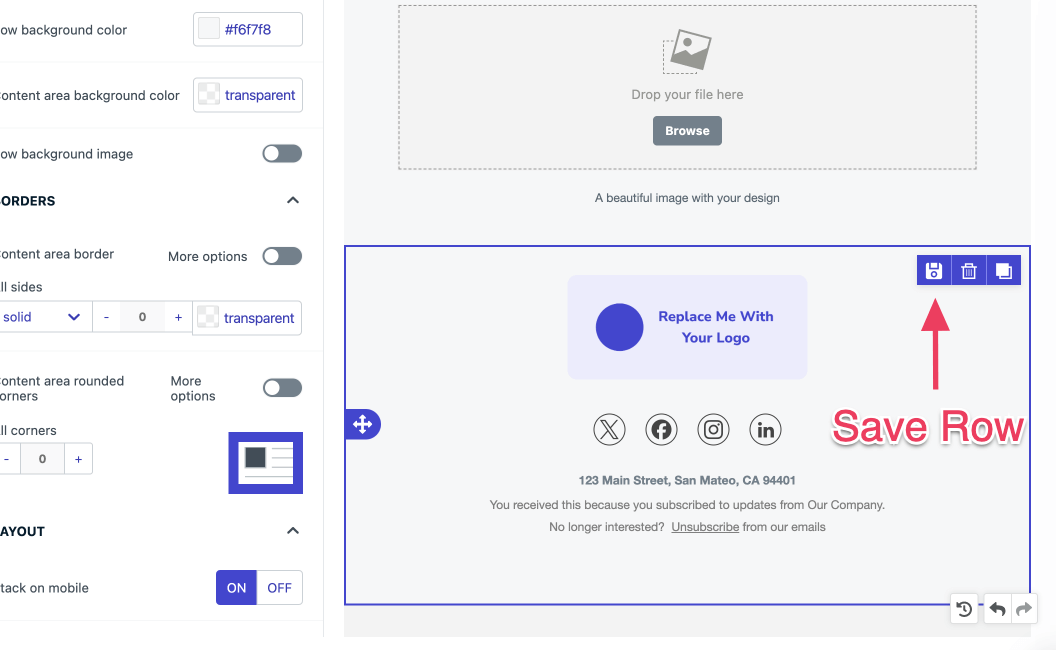
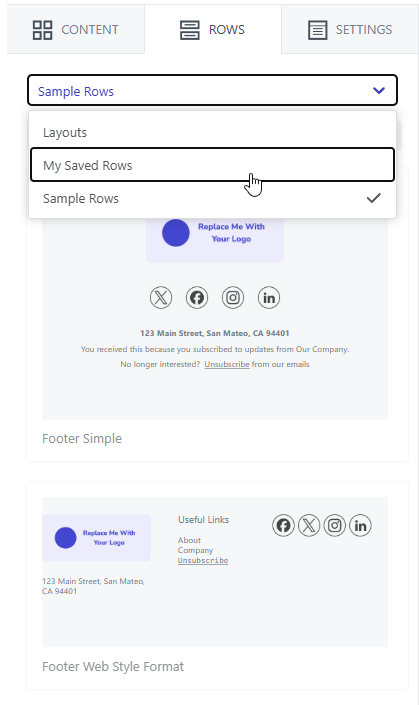
- Empty – blank row templates
- My Saved Rows – rows created by you or your team
- Sample Rows – OneSignal examples
Row properties
Click the outer edge of a row to edit row-level settings. If you see Content instead of Row when hovering, you’ve selected a content block. Click the outer container edge until the label reads Row.
| Row Property | Description |
|---|---|
| Backgrounds | Color or image behind the row. Recommended: set background color in Settings for consistency. |
| Borders | Border color, width, and style. |
| Layout | Show or hide rows on mobile or desktop. |
| Columns | Add, remove, or resize columns and adjust column padding. |
Content
Content blocks are the actual elements your users see—text, images, buttons, dividers, and HTML. Drag a content block into a row column. It automatically adapts to the column width.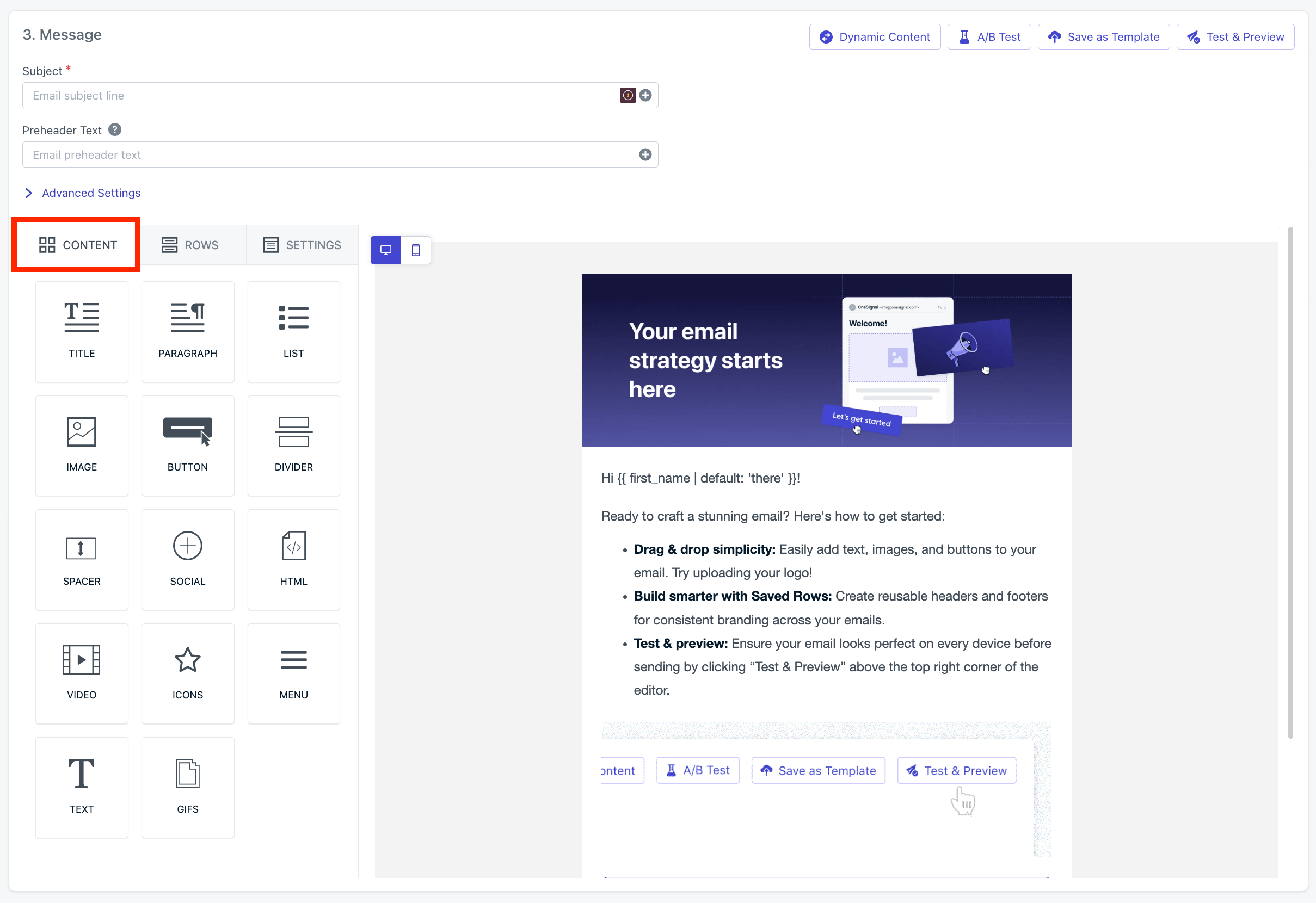
Decision rules for content blocks:
- Use Text blocks for most copy.
- Use Image blocks for visuals or custom typography.
- Use HTML blocks only when you need advanced styling or behavior.
Custom fonts
The Drag and Drop Editor supports system fonts by default. To use custom fonts, you must use an HTML block.HTML block
Recommended default: Use system fonts for body text and custom fonts for headlines only.
Images & video
You can upload images to the OneSignal dashboard and have them be accessible to your team. Change and apply effects to images like cropping, filtering, and more directly in the editor. You can also use URLs to images and videos. Make sure they are available via the provided URL.Recommended image sizes for email
Aspect Ratios:- Header/Banner images:
3:1or4:1(e.g.,600×200or600×150) - Hero images:
16:9or2:1(e.g.,600×338or600×300) - Square images:
1:1(e.g.,300×300) — good for product grids - Thumbnails:
1:1or4:3 - Max width:
600–700pxis standard (most email clients) - Design at
2xfor retina displays (e.g.,1200pxwide, displayed at600px)
- Keep individual images under
100–200KB - Total email size (including images) under
1MB - Smaller = faster load times and better deliverability
- JPG: Best for photos
- PNG: Best for graphics, logos, transparency
- GIF: For simple animations (keep file size small)
- WebP: Not widely supported in email yet — avoid
- Always include alt text for accessibility and when images don’t load
- Use inline CSS for styling (many clients strip
<style>tags) - Avoid background images (inconsistent support)
- Test across clients (Gmail, Outlook, Apple Mail all render differently)
- Outlook often ignores image dimensions, so set both width and height attributes in HTML
Links
Link tracking is enabled by default. Multi-link tracking is available. See Links and Deep Linking for more details.Unsubscribe links
All marketing emails should contain an unsubscribe link. Without an unsubscribe link, your emails will have a higher chance of being marked as spam. See Unsubscribe links for more details. OneSignal provides a default unsubscribe link that when used, will unsubscribe the user’s email Subscription. You can also include your own custom unsubscribe URL if desired. Just make sure you correctly manage the email Subscription (details in Create a custom unsubscribe page). Add OneSignal’s default[unsubscribe_url] into your emails via:
- HTML Block:
<a href="[unsubscribe_url]">Unsubscribe</a> - Select your text and use the Special links option in the editor or set
[unsubscribe_url]in the URL field
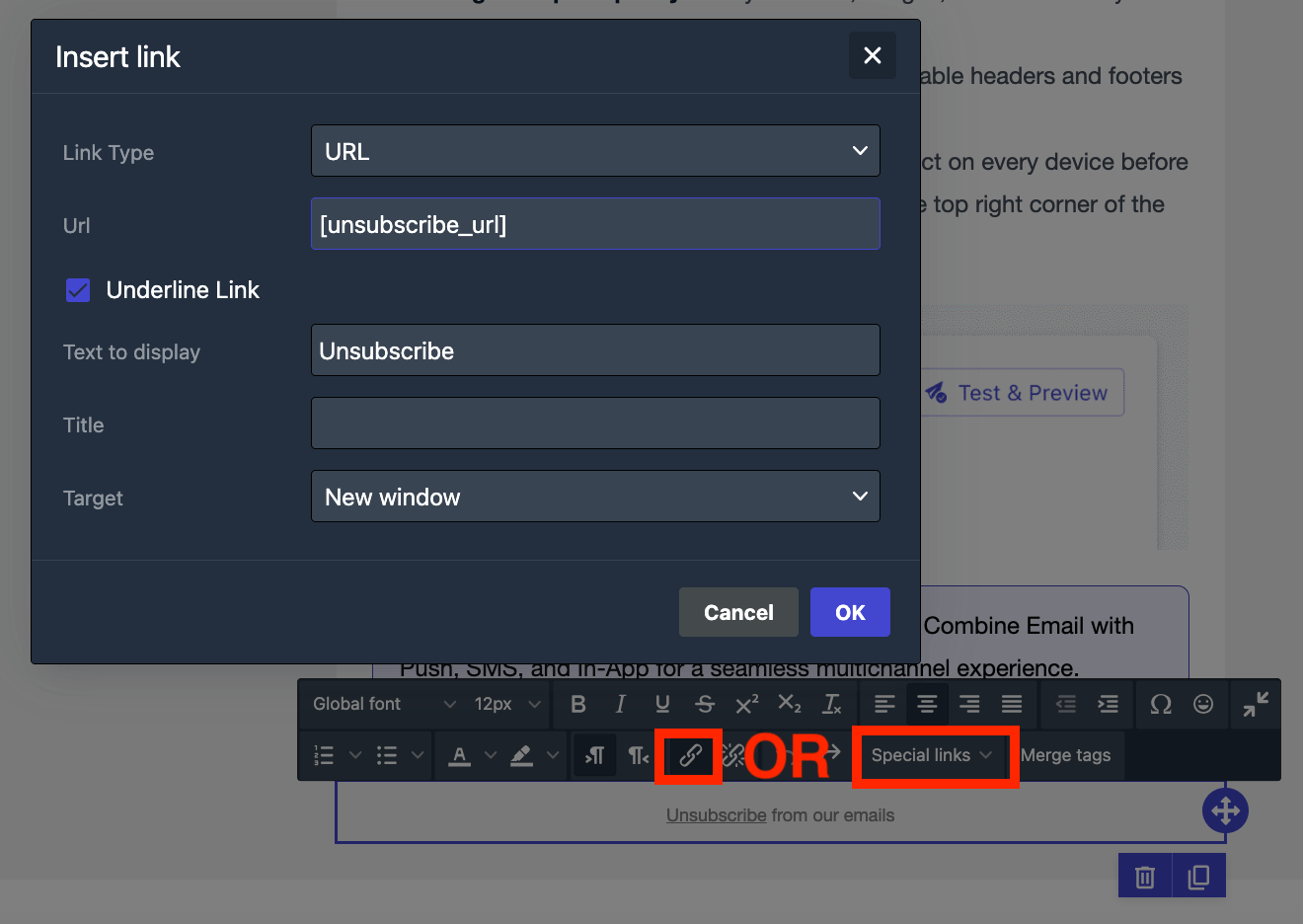
HTML blocks
HTML blocks allow custom markup and styling.- JavaScript is not supported
- Inline CSS is recommended
- Some clients strip classes and IDs
HTML blocks are the best place for advanced styling such as dark mode overrides. See Dark mode styling best practices.
Personalization
Use liquid templating to personalize messages. Example:{{ first_name | default: "there" }}
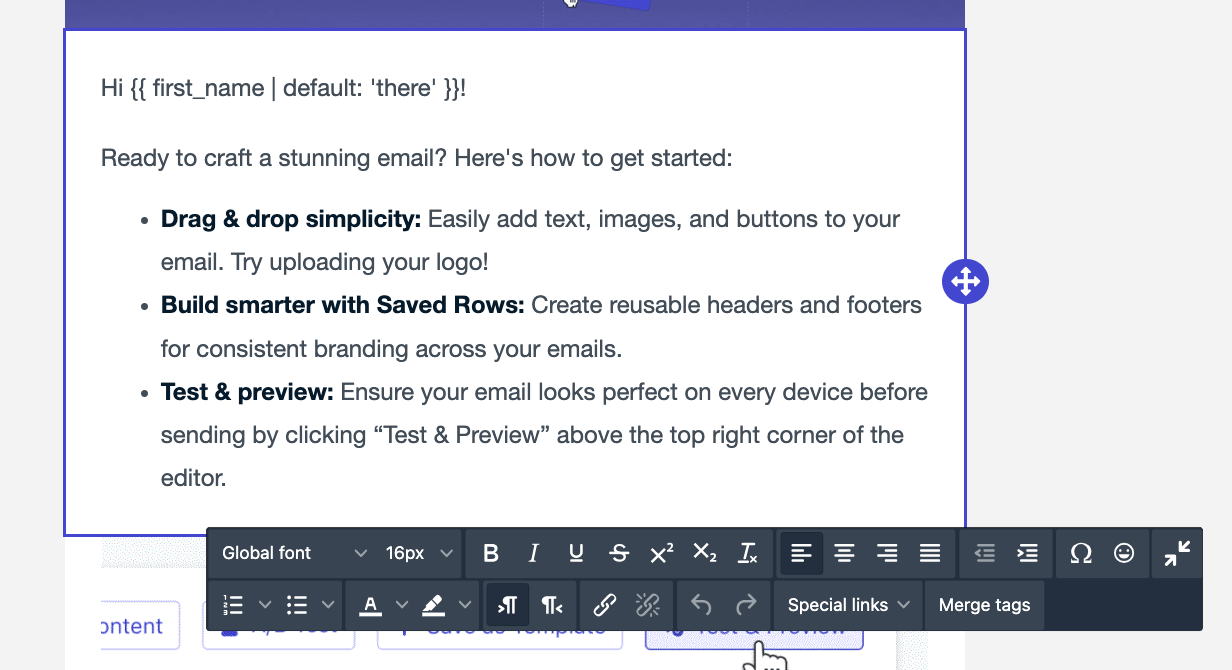
See Message personalization and Using Liquid syntax for more details.
Emojis
Emojis may render differently across email platforms.Save your work
You can save your email design as a template for future use.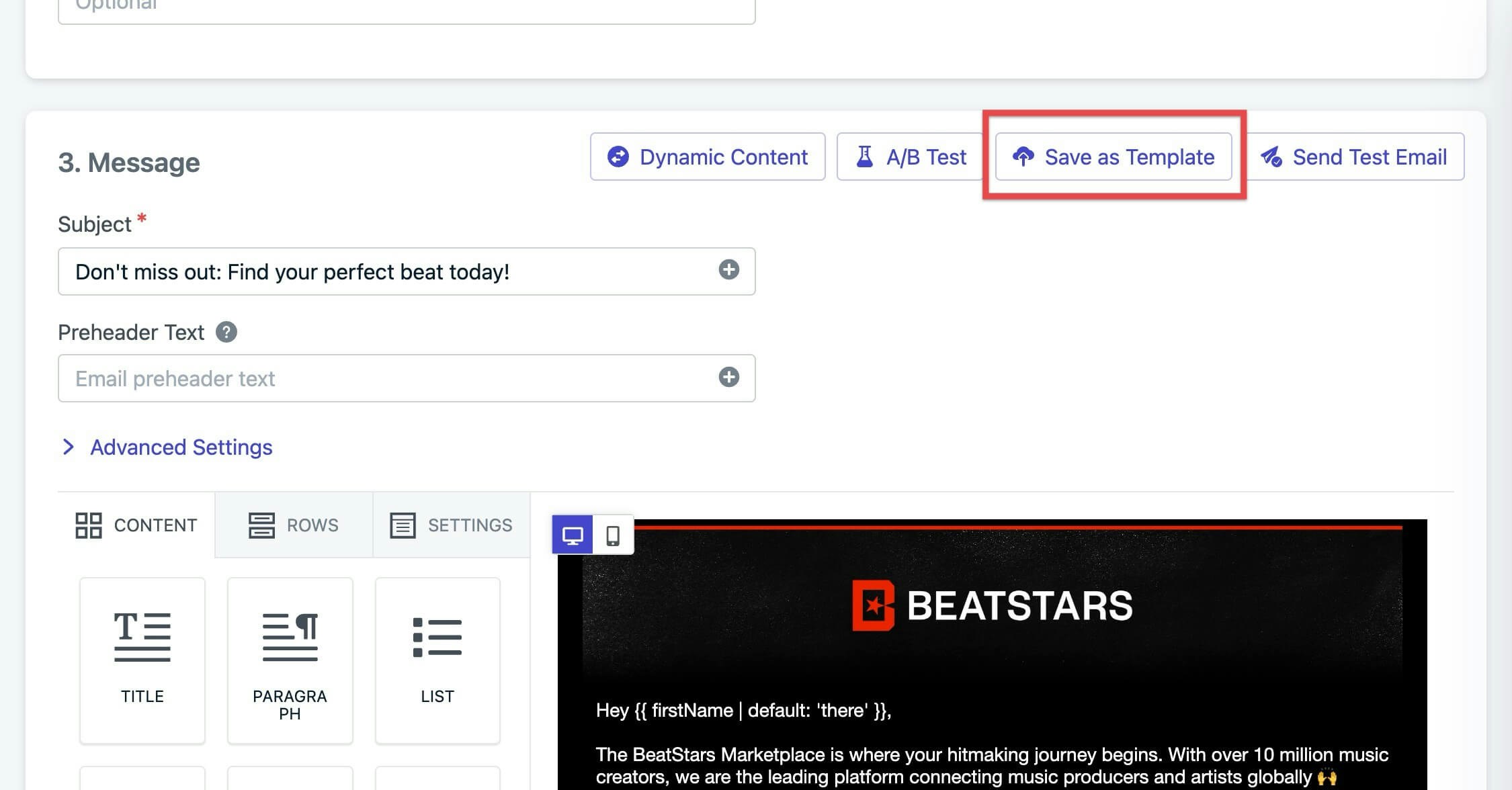
FAQ
How do I handle dark mode?
Most emails render acceptably in dark mode, but always test. For advanced dark mode styling, use HTML blockes and see Dark mode styling best practices.How do I add a custom unsubscribe link?
See Create a custom unsubscribe page for details.Related articles
- Email overview
- Email templates
- Unsubscribe links
- Dynamic content
- AB testing
- Message personalization
- Using Liquid syntax